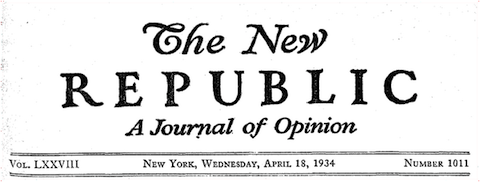
Here’s a challenge: for every book recommended to you by Amazon, pick one from the site Neglected Books. No fancy algorithms here, just old-fashioned serendipity, and you’re unlikely to see much overlap. You will be rewarded with book after fascinating book that has slipped through the usual marketing channels and fallen into obscurity. Most of the authors come recommended by well-known names, making them writers’ writers—people whose writerly difficulty or peculiar subject matter can narrow their readership.
This is not entirely a fair assessment, and in many cases, the work that achieves literary notoriety does so by chance, not mass appeal, but it is undoubtedly the case that certain kinds of writers write for certain kinds of readers. The literary editor Malcolm Cowley, helming The New Republic in 1934, thought so, and lamented a system that prevented books from reaching their intended readers. In a call to “America’s leading novelists and critics,” Cowley asked for lists of such books—and in perhaps a retroactive vindication of the listicle—published them in two articles, “Good Books That Almost Nobody Has Read” and “More About Neglected Books.” Neglected Books, the website, quotes Cowley’s announcement:
Each year… a few good books get lost in the shuffle. It may not be the fault of the publisher, the critic, the bookseller, it may not be anybody’s fault except that of the general system by which too many books are distributed with an enormous lot of ballyhoo to not enough readers. Most of the good books are favorably reviewed, yet the fact remains that many of them never reach the people who would like and profit by them, the people for whom they are written.
Cowley asked his targets to suggest “two or three or four” names and “a few sentences identifying them.” He got lists from about a dozen writers, including lions like F. Scott Fitzgerald, John Dos Passos, Sinclair Lewis, Thornton Wilder and critic Edmund Wilson, who gets a mention in both Fitzgerald’s and Dos Passos’ lists. (Fitzgerald also offered three other titles Miss Lonelyhearts by Nathanael West; Sing Before Breakfast by Vincent McHugh and Through the Wheat by Thomas Boyd.) Dos Passos, unlike most of the men, names a few women writers, including Agnes Smedley, now revealed to have been a triple agent for the Soviets, the Chinese, and Indian nationalists, “one of the most prolific female spies of the 20th century.” Dos Passos’ commentary on her autobiography Daughter of Earth—which he misremembers as Woman of Earth—is mostly understated: “An uneven but impressive I suppose autobiographical narrative of a young woman’s life in a Western mining camp and in New York.”
Libertarian journalist Susan La Follette, one of the few women writers surveyed, offers only one suggestion, Ilya Ilf and Evgeny Petrov’s 1931 comedic Russian novel The Golden Calf. The description alone in this L.A. Times review of a 2010 translation has me thinking this may indeed be an overlooked masterwork of totalitarian satire. La Follette said as much three years after its publication, writing of her disappointment, “I take this quite personally, because so few people even know about it that I rarely find anyone who can laugh over it with me.”
While The New Republic is well-known as a left-of-center publication, the meaning of the American Left in the thirties was much more inclusive, even of avowed Marxists like The New Masses editor Isidor Schneider, who names Imperialism, and The State and Revolution by Lenin and Leninism by Joseph Stalin. Next to the irony of naming two books that thousands have been coerced to read, Schneider contrarily names the The Poems of Gerard Manley Hopkins, from the aesthetically radical, but earnestly religiously conservative Irish Jesuit poet. (The latter two suggestions did not make publication since Schneider’s list was already quite long.)
As interesting as the lists themselves is the selection of responses to the second article. William Saroyan writes in to recommend Grace Stone Coates’ Black Cherry as the “finest prose you ever saw.” And legendary publisher Alfred A. Knopf writes with a lengthy and detailed explanation of the books listed that he published. Of one book named, Franz Kafka’s The Castle, Knopf writes, “The Castle is one of my really inglorious failures. It is, as Conrad Aiken says, a masterpiece. But in the original edition it sold only 715 copies, and since January 3, 1933, we have been offering it at the reasonable price of $1 and only 120 copies have been purchased.”
Read more on Cowley’s project at Neglected Books.
Related Content:
F. Scott Fitzgerald Creates a List of 22 Essential Books, 1936
Ernest Hemingway Creates a Reading List for a Young Writer, 1934
20 Books People Pretend to Read (and Now Your Confessions?)
Josh Jones is a writer and musician based in Durham, NC. Follow him at @jdmagness.


“Libertarian journalist Susan La Follette, one of the few women writers surveyed, offers only one suggestion, Ilya Ilf and Evgeny Petrovu2019s 1931 comedic Russian novel The Golden Calf. “nShe’s absolutely right. I’ve been reading it for a week now. It’s as fresh as if it was written yesterday, and not so much a satire of totalitarianism as it is a Mel Brooksian wild take on everything. Good book.
I would add “All About H. Hatterr,” by G.V. Desani.